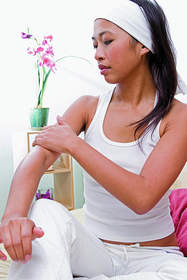MISSION, KS--(Marketwire - Aug 16, 2012) - (Family Features) From bug bites and dry skin to poison ivy and chronic skin conditions, itching makes life very uncomfortable. And it's an annoyance that gets under just about everyone's skin.
Sixty-five percent of U.S. adults have suffered from some kind of itch in the past 12 months; and for 26 percent of those polled, the itch was bad enough to see a healthcare professional, according to a recent poll conducted online by Harris Interactive for TriCalm, a new anti-itch gel.
You know it when you feel it, but what exactly is an itch, and is there anything you can do about it?
Anatomy of an Itch
The skin is your largest organ, and the average body is covered by about 20 square feet of it. Because it's so large and exposed, it comes in contact with a lot of potential irritants. Itching, known as pruritus, is a built-in defense mechanism against those irritants.
Sometimes the body's immune system overreacts to an illness, producing an itchy rash. (See sidebar story, "When is an Itch More than Just an Itch?") But for most non-illness related itching, here's how it works:
- Stimuli -- such as dust, pollen, bug venom or plant oils -- land on your skin.
- When the irritant gets past the surface layer, skin receptors get irritated.
- The receptors send a signal to your brain.
- You start to itch.
The natural response to an itch is to remove the irritant -- so the scratching begins. The scratching sensation interrupts the itching sensation because it tells your brain that the irritant is gone. While this may give some initial, immediate relief, scratching ends up irritating the nerve endings in that spot even more -- and can open up the skin, exposing it to more irritants. And more itching.
Itch Treatments
It's important to make sure you know the cause of the itching so you can take appropriate measures to stop it. There are some things you can do to help reduce itching and soothe irritated skin:
- Avoid scratching -- Cover the area with bandages or dressings if you can't stop scratching. If needed, trim your fingernails and wear gloves to bed.
- Apply cool, wet compresses.
- Apply a topical anti-itch cream or lotion to the affected area.
- Moisturize your skin with a high-quality cream at least twice a day.
"Some anti-itch creams work by reducing inflammation, but that's not always enough," says Dr. Vishakha Gigler, a San Diego based dermatologist. "TriCalm, a steroid-free anti-itch gel, binds to a subset of nerves called Type C fibers. These are the nerve cells that send the signals of itching, stinging or burning to the brain. By binding to these nerve cells, TriCalm works to inhibit the transmission of those signals. This results in a rapid reduction in itching, stinging and burning." Learn more, and request a free sample, at www.tricalm.com.
Kids Get Itchy, Too
The TriCalm poll found that itches make kids -- and their parents -- feel pretty bad.
- 81 percent of parents are miserable when their kids are miserable from itch symptoms.
- 62 percent said itching keeps their children up at night.
- 68 percent indicated they've used creams to treat itch symptoms.
- 75 percent said they worry about using steroid treatments on their children to treat itch.
To learn more about a steroid-free treatment that is safe for kids over the age of two, visit www.tricalm.com.
When is an itch more than just an itch?
It's obvious when an itch is caused by a bug bite or poison ivy. But what if you're not sure what's causing the itch?
- Dry Skin -- Itching that doesn't come with obvious skin changes, like a rash, is most often due to dry skin, also known as xerosis. Dry skin usually results from environmental factors like hot or cold weather with low humidity, and washing or bathing too much.
- Skin Conditions -- Eczema, psoriasis, scabies, hives, and chickenpox can cause itchy skin. The itching is usually accompanied by other symptoms such as bumps, blisters, and red, irritated skin.
- Internal Diseases -- These include liver disease, kidney failure, thyroid problems, celiac disease and some cancers. Typically the itching affects the whole body, not just one area.
- Allergic Reactions and Irritations -- An irritation can come from wearing wool, or coming in contact with soaps, chemicals or other substances. Sometimes the substance can cause an allergic reaction, such as poison ivy or some food allergens.
- Nerve Disorders -- Multiple sclerosis, diabetes mellitus, pinched nerves and shingles are conditions that affect the nervous system, and thus can cause itching.
- Drugs -- Some antibiotics, antifungal drugs or narcotic pain medications can cause rashes and itching.
It's important to understand and treat the cause of itchy skin, so always seek medical advice before choosing a treatment.
About Family Features Editorial Syndicate
This and other food and lifestyle content can be found at www.editors.familyfeatures.com. Family Features is a leading provider of free food and lifestyle content for use in print and online publications. Register with no obligation to access a variety of formatted and unformatted features, accompanying photos, and automatically updating Web content solutions.
Contact Information:
Matthew Barksdale
mbarksdale@familyfeatures.com
1-888-824-3337
http://editors.familyfeatures.com
